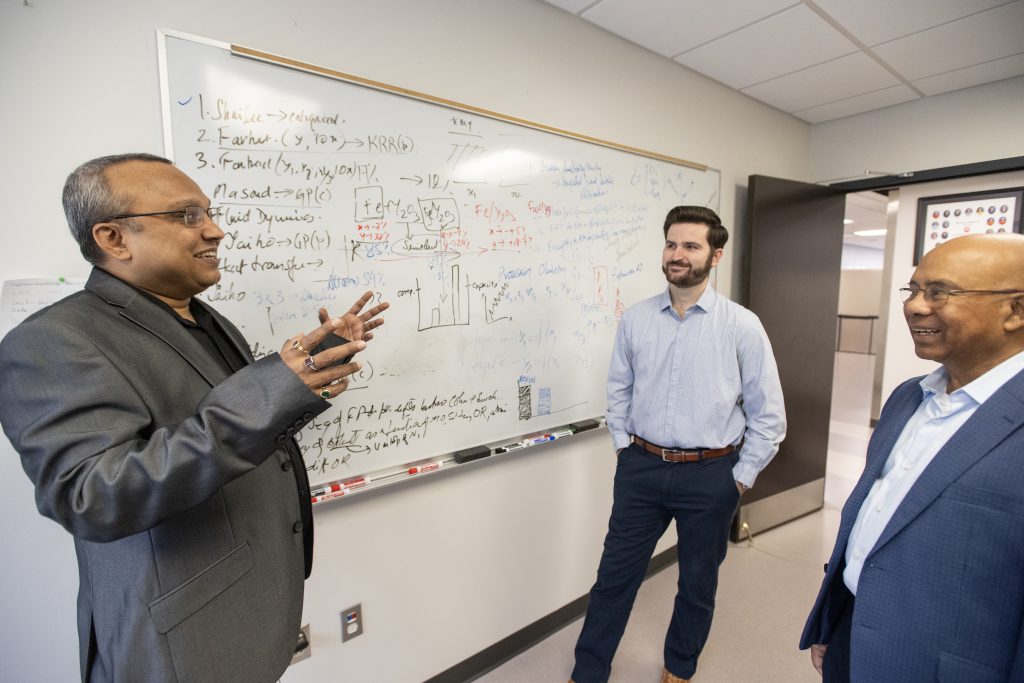
Samrat Choudhury (left), associate professor of mechanical engineering at the University of Mississippi, discusses nuclear energy research with graduate student Ben Rhoads and Raj Rajendran, mechanical engineering chair. Photo by Thomas Graning/Ole Miss Digital Imaging Services
Mechanical engineering graduate student uses AI to design optimized nuclear fuel
By Erin Garrett
Students at the University of Mississippi can contribute to improvements in nuclear energy through the US Department of Energy’s University Nuclear Leadership Program.
As a member of the University Nuclear Leadership Program, Ole Miss joins a select group of institutions that can receive funding for the next ten years from the DOE’s Office of Nuclear Energy for student research projects.
“This is a highly competitive fellowship,” said Samrat Choudhury, associate professor of mechanical and general engineering. “As an approved university, we are joining institutions like MIT and Berkely.”
The program awards scholarships to undergraduates and fellowships to graduate students who are working in fields related to nuclear energy.
“We would like to generate more workforce in nuclear energy to motivate our students to get into nuclear energy-related activities,” Choudhury said. “Students in computer science focusing in cybersecurity or mechanical engineering students working in heat transfer can all apply—it’s a broad umbrella and a very good opportunity for our students.”
Nuclear energy accounts for roughly 20 percent of the country’s electricity and is one of the most proven sources for mass production of energy, Choudhury said.
“It’s almost zero emission,” he said. “There is some, but not a whole lot. It is a low-cost, well-proven technology that has been around for more than fifty years.”
Benjamin Rhoads, who joined the mechanical engineering doctoral program this spring, is the first Ole Miss student to have received a fellowship from the UNLP program.
“We want to make nuclear fuel more efficient, environmentally friendly, safe, and cost-effective by leveraging modern machine learning tools,” Rhoads said. “These machine learning tools can help optimize the processes through which nuclear energy is generated.
“That’s a really big task—especially when we’re talking about processes involving radioactive materials, which may be controversial at times.”
The main strategy is to use A.I. to analyze data about nuclear energy production, Rhoads said. This would streamline and maximize the process.
“As humans we can’t always deal with the massive amount of data produced during nuclear energy generation processes; that’s where AI comes in,” he said. “Throughout this fellowship, there will be multiple ways to use it.”
Machine learning could also accelerate the design of new types of fuel. That is typically a decades-long process, Choudhury said.
Rhoads will conduct computational work at the university and collaborate with the Pacific Northwest National Laboratory. The fellowship also provides financial support for Rhoads to spend a summer at any DOE national lab to get hands-on experience and work with scientists from national labs.
He is looking forward to conducting experimental research on nuclear fuels at the Idaho National Laboratory as part of his summer internship opportunity.
“We have increasing energy demands and we’re running out of resources, but nuclear energy is a reliable alternative,” Rhoads said. “I’m excited to be able to work on this and be part of a much bigger effort to solve this problem.”




